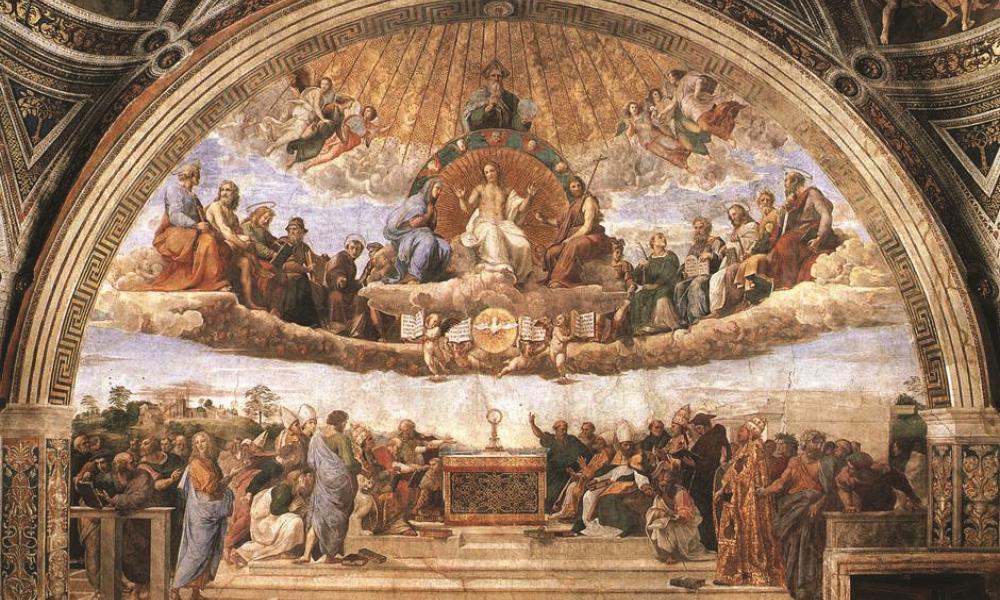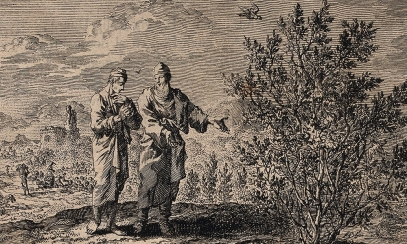
The Creed Part 8: What Do We Believe About the Catholic Church and Communion of Saints?
A Nine Part Series on the Creed
A Nine Part Series on the Creed
By: Sr. Janet Schaeffler, OP, an Adrian Dominican sister, is Associate Director of the Office for Catechetics/Religious Education of the Archdiocese of Detroit
By: Sr. Janet Schaeffler, OP, an Adrian Dominican sister, is Associate Director of the Office for Catechetics/Religious Education of the Archdiocese of Detroit
I believe in the holy catholic Church, the communion of saints …
Certain peoples of Zimbabwe in southern Africa greet each other by saying, “How are you?” The response is, “I am well if you are well.” The first person then says, “I am well, so we are well.” What a commentary on that African tribe! That ritual says much about what we pray in the next two sections of the Creed. The Church and all its members (its saints) – living and dead – are united, and our well-being is connected with each other.
I believe in the holy catholic Church …
In the Nicene Creed, we profess our belief in the four marks of the Church: one, holy, catholic and apostolic. The Apostles’ Creed mentions only the holy catholic Church.
These marks (or signs) are not only gifts given by God to the Church, but also tasks which we, the Church, must constantly strive to bring about as God’s people.
We believe in a Church that is holy. By this, we do not mean that the Church has attained perfection. Rather, we mean that the Church is an effective means of human holiness and wholeness. The sacraments nourish holiness, for example, even if the human beings who celebrate the sacraments are not perfect. We believe in a Church that is both holy, yet still sinful. Because perfect holiness is something yet to be acquired, we are imperfect and always in need of repentance.
The Church is holy when it is with the poor, with the outcast, with the forgotten. The Church is holy when it makes holiness its reason for existence. It calls us to more than the material world. It reveals the goodness of God and the sacredness of ordinary life by making all of life holy at every turn. That is revealed in the sacraments and the Catholic sacramental principle that all life, all creation, is holy.
We believe in a Church that is catholic. This word, first used in reference to Christians by St. Ignatius of Antioch around A.D. 100, means ‘universal’ or ‘all-inclusive’ and refers to Christ’s Church throughout the world. To believe in such a Church is to believe that anything good, true and beautiful is welcome in the Church. As God’s people, we go into the world on a mission to bring the message of God’s love to all people.
I believe in the communion of saints …
People who need people: we proclaim our interdependence when we pray this portion of the Creed. And, rightly so, for that is how God created us. We are not saved as individuals. We are saved as members of Christ’s Body.
The doctrine of the communion of saints flows from our belief that we Christians are closely united as one family in Christ. The word ‘saints’ here means not just those who have been canonized by the Church, but all God’s holy people. (CCC 946) All who are in Christ have been made holy with the holiness of God. Thus Paul writes to the ‘saints’ of Ephesus, Corinth, Philippi and Colossus. Today, he would write to the ‘holy ones’ of Lansing, Las Vegas or Detroit.
The phrase ‘communion of saints’ was put into the Apostles’ Creed as an emphatic statement that the Church as the People of God is a family – not a loose gathering of people seeking private salvation. Pope Leo XIII said, – The communion of saints is simply ... the mutual sharing of help, atonement, prayers and benefits among all the faithful.
How is the Church …
… one,
The Church is one because its roots are in the Trinity. It is also one because it was founded by Christ and is animated by the Spirit. Charity is what binds all together in the Church, as well as:
our profession of faith which is traceable to the Apostles (the Apostles’ and Nicene Creeds),
common celebration in worship, especially the sacraments,
succession of the bishops from the Apostles.
Unity does not mean uniformity. God has gifted the Church with a diversity of gifts and a variety of people. (CCC 812-818, 820, 866)
… holy,
Jesus Christ is the model of all holiness in the Church. The Holy Spirit, dwelling in the Church, fills it and unites it. God is the ultimate source of holiness in the Church. Because the Spirit lives in us and in the Church, the Church is holy.
The Church is holy because in it can be found the means to holiness, the means to the wholeness of personal development.
A major insight of Vatican II was that all of Jesus’ disciples, not only the clergy and religious sisters and brothers, are called to holiness.
The true test of a Christian’s holiness is a life of service to others. (CCC 823-829, 867)
… catholic (universal),
The Church is catholic because Christ is present in the body as its head, giving it the fullness of the means of salvation – a complete and correct confession of faith, an ordained ministry traceable to the Apostles and a full sacramental life, especially the gift of the Eucharist.
The Church is catholic because it follows the Lord’s command to teach all nations. It reaches out to all people at all places in all times. Poor and rich, learned and unlearned, all people everywhere are invited to be members of the Lord’s Body.
The Church is catholic because it continues to teach all that Christ taught. (CCC 830-835, 868)
… apostolic
The present bishops of the Catholic Church can trace themselves back to the first leaders of the Church, the Apostles. Christ founded His Church on the Apostles who in turn appointed successors.
The Church is also apostolic in that it professes the same doctrine and Christian way of life taught by the Apostles, preserving the Gospel of Jesus.
Apostle means ‘one who is sent.’ In this sense, all Christians are apostles and, by their baptism, have a role in sharing Christ’s Good News with others. (CCC 857-865, 869)
5 reasons: what is the Church for?
1 The Church’s purpose is to do in flesh and blood what Jesus did and does. Jesus is Priest. Jesus is Prophet. Jesus is King. (CCC 436)
2 The Church has the commission and the power to continue the priesthood of Jesus – in all its members, each according to his or her vocation.
3 The Church has the commission and the power to continue the prophetic (speaking for God) work which Jesus did and does – again, in all its members; the ordained in their way, the laity in their way, all in Christ’s way.
4 The Church has the commission and the power to continue the kingly rule of Christ – the most problematic of the three, because it includes washing others’ feet as well as ‘binding and loosing.’
5 The mission of the Church is to participate in the saving, healing and forgiving work of Jesus. We are the living presence of Christ reaching out in service to our sisters and brothers in the human family. Being Church-for-the-world is our vocation.
Whenever we pray, we pray as part of the Church and we pray for the Church, even if we don’t remember to do so explicitly.
Even the most isolated hermit prays as part of the whole Body of Christ.
Readings:
“Go therefore and make disciples of all nations.” (Matt 28:16-20)
Paul to the Church in Rome: “one body with many members.” (Rom 12:4-12)
Prayer for Christian Unity:
Lord Jesus Christ, at your Last Supper you prayed to the Father that all should be one.
Send your Holy Spirit upon all who bear your name and seek to serve you. Strengthen our faith in you and lead us to love one another in humility. May we who have been reborn in one baptism be united in one faith under one Shepherd. Amen.



